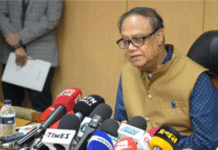
The country’s economy has gone through some challenges both in internal and external areas like weak budget implementation, stagnant private investment, low level of employment generation, slower export earnings, decline in remittance inflow despite a record-high GDP growth in the outgoing fiscal year of 2016-2017.
Finance minister AMA Muhith announces the national budget for the FY 2017-2018 today against the backdrop of the challenges and comfortable stability in political environment and overall macroeconomic arenas.
Along with the other discomforts, the Value-Added Tax and Supplementary Duty Act-2012 which will come into force on July 1 has created resentment among the businesspeople against the new law as they think that the single 15 per cent VAT rate stipulated in the regime would affect small- and medium-scale businesses and consumers.
Economists and business leaders said that the overall economic performance was relatively good and stable in the outgoing FY17 mainly because of political and macroeconomic stability, like the previous FY16.
Despite record-high economic growth and stability, economy suffered from stagnant private investment and insufficient job creation, they said.
Lack of confidence of businesspeople, increased cost of production, unfavourable environment for doing business, inadequate progress in infrastructure development, good governance and reforms, and shortage of gas and electricity forced the businesses not to make investment at potential level that resulted in low level of job creation, they said.
According to the latest provisional estimation of the Bangladesh Bureau of Statistics, the country’s gross domestic product or GDP growth will be 7.24 per cent in the outgoing fiscal year, highest ever in the history of the country.
The Centre for Policy Dialogue in its state of the Bangladesh economy report termed the weak external issues like slower export earnings and decline in remittance inflow as ‘crack in wall’.
Traditionally, Bangladesh’s external sector has served as foundation of the economy and it has been a star performer with robust export growth, high inflow of remittance, comfortable current account balance and the consequent rising reserves and stable exchange rate, it said.
According to the Export Promotion Bureau, export earnings grew by only 3.92 per cent in the first 10 months of the current fiscal year and stood at $28.72 billion against the annual target of 8 per cent.
On the other hand, remittance inflow has been in the negative terrain throughout the July-April of FY17 and in the first 10 months of the fiscal year, inward remittance went down by 16 per cent from that of the same period in the last fiscal year.
The country received $10.28 billion in remittance in the period against $12.25 billion in the same period of FY16, according to the Bangladesh Bank data.
The share of private investment to gross domestic product increased only by 0.02 percentage point to 23.01 per cent in FY17 from 22.99 per cent in the previous year.
Considering the overall economic performance, Policy Research Institute executive director Ahsan H Mansur expressed his doubt over the government’s estimation of GDP growth at 7.24 per cent for the year amid a decline in remittance inflow and poor growth in export, investment and agriculture sector.
He said that the overall revenue generation and agriculture sector were not performing well, ADP remained as usually sluggish and inflation was on rising trend.
The situation of banking sector became worst in the year, he said.
Federation of Bangladesh Chambers of Commerce and Industry president Shafiul Islam Mohiuddin termed the outgoing fiscal year as a mixed one during which the economy grew at better pace while the private sector investment and employment generation slowed.
There was political stability but the government could not utilise it in boosting private investment and employment generation mainly due to long-standing problems like lack of infrastructure, shortage of gas and electricity, he said.
Local investors were in tension over implementation of the new VAT law.
Dhaka Chamber of Commerce and Industry president Abul Kasem Khan said that overall economic performance was comparatively better and stable in the year.
He said that though Holey Artisan incident put negative impact on investment, the country successfully overcame the impact of the situation.
Weakness in good governance in the banking sector was also a major problem in the economy, he said.
Exporters Association of Bangladesh president Abdus Salam Murshedy said the export-oriented sector faced various challenges and the export market became squeezed in the year due to devaluation of the euro and other currencies of competing countries, appreciation of local currency taka, Brexit and increased cost of production in the country.
Local exporters also lost price competitiveness on the international market, he added.
Source: New Age









